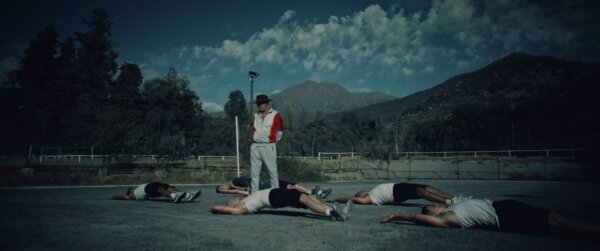Writer and Director: Felipe Carmona
Pinochet’s generals were imprisoned for life under Chile’s new administration. They were taken to a prison at the foot of the Andes where they would live out their sentences, which impossibly stretched out into centuries. But in a television interview, one of the prisoners suggested that their gaol was more like a hotel. In his debut feature, Felipe Carmona imagines what this prison was like.
It’s hardly a prison at all, but a rambling house in its own extensive grounds. The generals are not required to wear uniforms and their guards act as servants. One general keeps birds in the corner of the garden while another is allowed to leave at regular intervals to visit his grandchildren. This penal Cordillera (prison in the Andes) is not the worst place in Chile to spend one’s last days.
But when the press hears about prisoners’ luxuries, the public is appalled and the government steps in and removes some of these privileges. For a start, they are not allowed contact with their lawyers or with the Truth and Reconciliation Commission. One general can no longer get his fancy aftershave from a travelling salesman who supplies the prisoners with items from the outside world.
The old men spend their days companionably. Two generals quiz each other about Olympic track and field champions while another fiddles around, fixing stuff like the radio-controlled toy car that turns up at crucial points in the story. The fittest of the bunch runs exercise boot camps for the prison guards. There’s something of Paolo Sorrentino’s Youth in this set-up, where old men reflect on their past while staying in a mountain hotel.
The guards in the Andes prison are also trapped in a way. They live in army-style barracks and while sometimes they patrol the perimeter of the gardens with their rifles in their hands, much of their time is devoted to looking after the generals; making them drinks, cutting their nails, ensuring they take their pills. One young man, Navarrete, appears particularly institutionalised and is almost scared of the men he is meant to be guarding. In a violent scene towards the end, it is difficult to see whether Navarrete has become as bad as the old regime or if he is a symbol of a new Chile. Writer/director Felipe Carmona supplies no easy answers.
It’s no surprise to learn that Penal Cordillera was originally a stage play as the cast acts as a tight ensemble and Carmona obtains excellent performances from all of his actors, especially Hugo Medina, who plays one of the generals and Andrew Bargsted, the quiet but watchful Navarrete. Mariá Portugal’s score is the perfect match for this brooding examination of masculinity and recrimination.
Some viewers may be disturbed by how sympathetically the generals are portrayed. These old men are just like other old men, worried about their cholesterol and stuck in their routines. But that is Carmona’s point: monstrous acts can be carried out by any one of us.
Penal Cordillera is screening at the BFI London Film Festival 2023.

